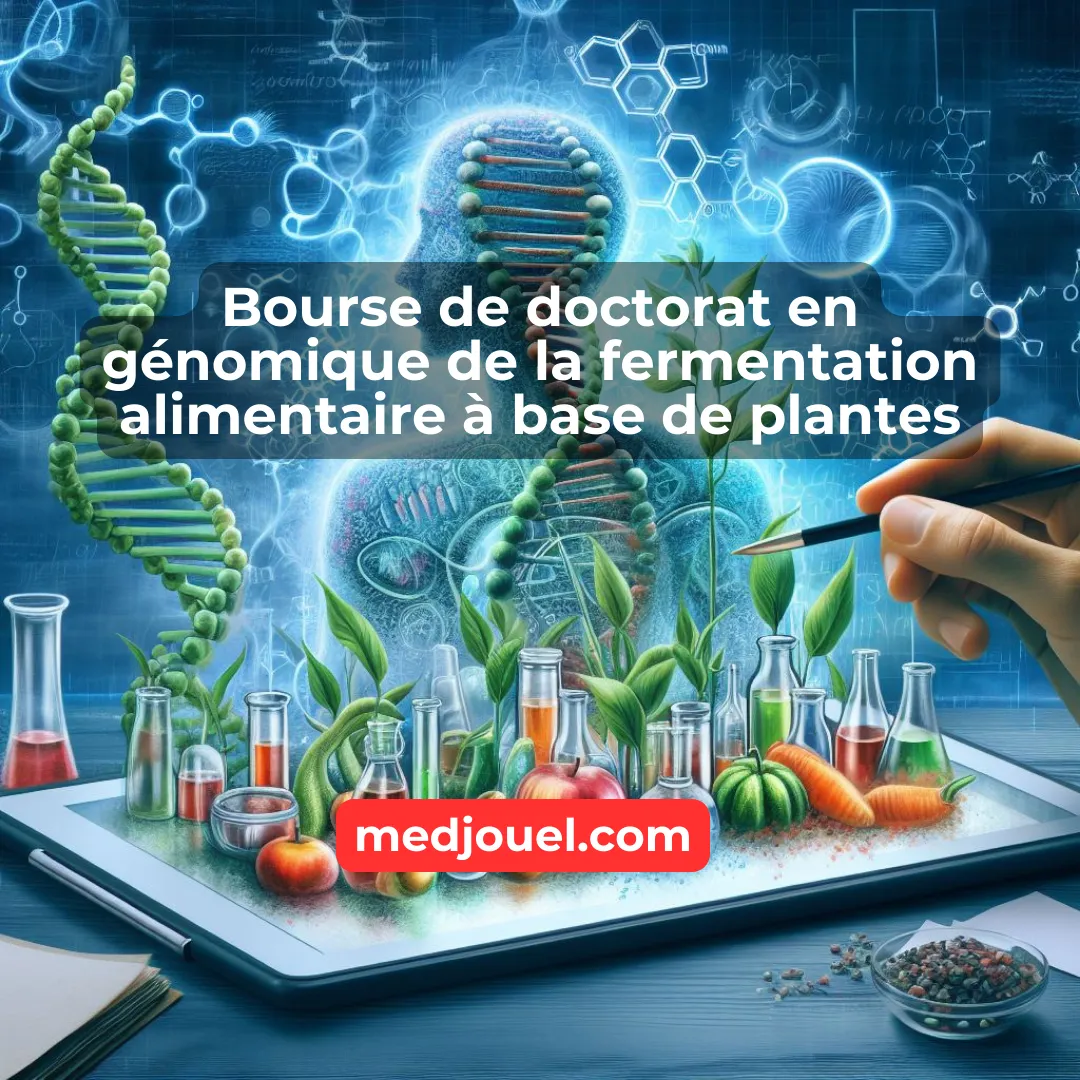- Biologie
- Biochimie
- Biotechnologie
Description du sujet
Title: DC2, PhD fellowship in plant-based food fermentation genomics.
Researcher profile: Doctoral candidate.
Research field: Food Microbiology, Fermentation, Genomics.
Type of contract: Temporary.
Job status: Full-time.
Duration: 36 months.
Application deadline: 15/05/2024 23:59 – Europe/Brussels.
Envisaged job starting date: September 2024.
How to apply: submit your application form through the FAIROmics website.
Please note that this PhD position will lead to the award of a double diploma from Wageningen University and Research in The Netherlands and the National and Kapodistrian University of Athens in Greece.
Project description:
The FAIROmics initiative, an interdisciplinary research programme, will gather universities, research centres and private companies to enable the FAIRification of omics data and databases interoperability and develop knowledge graphs for data-driven decision-making to rationally design microbial communities for imparting desirable characteristics to plant-based fermented foods in the context of open science and its regulations. The FAIROmics training programme aims to develop doctoral candidates’ skills at the interface between artificial intelligence, life sciences, humanities, and social sciences.
Scientific context:
Plant-based dairy and meat alternatives have grown in popularity in recent years for various reasons, including sustainability and health benefits, as well as lifestyle trends and dietary restrictions. However, plant-based food products can be nutritionally unbalanced, and their flavour profiles may limit their acceptance by consumers. Microorganisms have been used in making food products for millennia. However, the diversity of microbial communities driving plant-based fermentations, as well as their key genetic and phenotypic traits and potential synergies among community members, remain poorly characterised. Many data exist, but they are spread into different literature (scientific and grey) or, in the best case, in different databases. However, they are not always reusable because they are difficult to find and access and because databases are not systematically interoperable.
Objectives:
We are looking for a Doctoral Candidate (DC) to join our project at multiple sites in Europe with a master’s degree in Food Microbiology / Molecular Microbiology / Analytical Chemistry / Biotechnology / Biochemistry / Bioinformatics who is interested in new concepts to develop safe innovative plant-based fermented foods based on genome mining of starter bacteria.
The main objective of this research project is to rationally design mixed bacterial cultures to ferment plant protein-based ingredients with desirable outcomes. This will be based on predictions derived from available data sets on individual lactic acid bacteria (LAB) strains (with available sequenced genomes) and favourable fermentation outcomes upon growth on different plant-based substrates. Strain capabilities relevant to the preservation and safety of plant-based products will be determined. The performance of mixed cultures to ferment plant-protein-based ingredients regarding the formation of favourable flavour compounds, removal of unwanted chemical contaminants (e.g. off-flavours, mycotoxins), and acid formation and preservation effect (suppressing the growth of spoilers and pathogens) will be verified. Linking of functional properties of strains and genomic traits with fermentation outcomes will support the design of novel fermented foods.
The project is expected to generate a model to predict outcomes of different plant protein-based fermentations using mixed cultures of lactic acid bacteria with respect to flavour formation, removal of unwanted compounds, and preservation capacity. This allows for steering relevant fermentation outcomes based on key gene functions and fermentative capacity of LAB strains on different plant-based substrates.
Location and planned secondments:
National and Kapodistrian University of Athens, 8 months: metabolomics analyses of metabolites in plant matrices upon fermentation.
University of Reading, 3 months: physiological evaluation of key gene expression in selected lactic acid bacteria.
Enrolment in Doctoral degree:
1st-degree awarding organisation: Wageningen University, Wageningen, Netherlands, https://www.wur.nl/en/wageningen-university.htm
2nd-degree awarding organisation: National and Kapodistrian University of Athens, Greece, https://en.uoa.gr/
Supervisors team:
The supervisors team at NIZO consists of Dr. Marjon Wells-Bennik, Dr. Herwig Bachmann and Dr. Eric Hester. Supervision from Wageningen University and Research is provided by Professor Marcel Zwietering. Supervision at NKUA is provided by Assistant Professor Marilena Dasenaki and Associate Professor Vasilis Valdramidis. At UREAD, Associate Professor Kimon-Andreas Karatzas will be the supervisor.
Within NIZO, comprehensive knowledge is available on fermentation characteristics of starter culture strains when grown on dairy and plant substrates in relation to development of flavour and controlling food safety and quality. The lead supervisor is Principal Scientist Dr. Marjon Wells-Bennik. She has a background in food microbiology (including functional genomics expertise) and is a visiting scientist at Wageningen University. She initiated various consortium projects with multiple academic and industrial stakeholders, including a recent project on “Microbial contaminants in plant-based protein ingredients”. Since 2002, she has supervised 8 PhD students; 2 are ongoing, and 6 obtained their degrees. She has published over 70 research articles and filed two patents. She can transfer fundamental knowledge to more applied research. Co-supervisors at NIZO are Dr. Herwig Bachmann (extensive expertise in fermentation, dairy and dairy-alternative technology) and Dr. Eric Hester (senior bioinformatician/data scientist).
At Wageningen University and Research (WUR) supervision will be provided by Prof. Dr. M.H. Zwietering who is the Head of the Food Microbiology group (FHM) and has a background in modelling. His group investigates aspects of food safety, food spoilage and fermentation.
At the Kapodistrian University of Athens (Department of Chemistry), supervision is provided by Associate Professor Dr. Vasilis Valdramidis and Assistant Professor Dr. Marilena Dasenaki. Dr. Valdramidis holds a Ph.D. degree in Chemical Engineering from the Catholic University of Leuven, Belgium and a primary degree in Agriculture (Food Science and Technology) from the Aristotle University of Thessaloniki (Greece). He published around 100 manuscripts in peer-reviewed journals and chapters in books. He supervised eight post-doctoral researchers and more than 10 Ph.D.s (as main or co-supervisor). Dr. Dasenaki’s research focuses on the study of food metabolomics using cutting-edge mass spectrometric techniques and advanced chemometric tools, and she has published more than 45 peer-reviewed papers and four book chapters.
At the University of Reading (UREAD), supervision is provided by Associate Professor Dr Kimon A. G. Karatzas. He heads the Food Microbiology group in the Department of Food & Nutritional Sciences, University of Reading. His scientific outputs include more than 55 articles in high-impact journals, one international patent and various chapters in books. Currently, his group comprises 6 PhD students, and previously, he successfully supervised 9 PhD students as the main PI and 12 as Co-PI and nine postdoctoral researchers and visiting scientists. He has a longstanding experience in microbial physiology of stress and molecular biology and more than 22 years of experience in food fermentations.
The student will benefit from the knowledge that has been built up in the domain of this project and be supervised by experienced staff in the field of food microbiology, fermentation, and bioinformatics at NIZO and WUR. In addition, the student will greatly benefit from the chemical analytical and predictive modelling capabilities at NKUA and access to molecular biology expertise at UREAD. Moreover, collaboration will be set up on semantic data mining at the start of the project, and the use of artificial intelligence to train and improve models for rational predictions of favourable fermentation outcomes.
Host institutions description:
The student in this project will be appointed at NIZO. NIZO (https://www.nizo.com/) is a leading company in contract research for better food and health with one of the most advanced R&D centres in the world. NIZO has state-of-the-art research facilities and laboratories, highly skilled experts and comprehensive expertise on bacteria, proteins and processing. NIZO’s focus is on the development and application of innovations for the global food industry and related markets. This includes cheese research, development and production, and development of plant-based alternatives. With 75 years of experience with starter cultures and food safety and quality control and with up-to-date new technologies, including genomics approaches, NIZO brings the latest food technologies to life. NIZO is continuously looking for new ways of improving food products and, at the same time, quality of life. The degree awarding institutions for the student in this project will be and the National and Kapodistrian University of Athens (NKUA).
WUR (https://www.wur.nl/en.htm) is an internationally leading education and research organisation in life sciences with more than 10,000 students (of which 25% are from abroad). WUR participates through the laboratory of Food Microbiology, FHM (www.wur.nl/fhm) and is headed by Prof. M.H. Zwietering. FHM aims to understand the behaviour of food-associated microbes to assure the quality and safety of food. The research areas range from eco-physiology to risk assessment and genomics of food-associated microorganisms in food supply chains and aspects of food safety, food spoilage and fermentation are investigated. FHM has fully equipped microbiological labs both for fermentation research and for food safety research.
The Department of Chemistry (DoC) of the NKUA will be involved in the project. DoC has expertise, state-of-the-art infrastructure and facilities available for performing research in the areas of food science, food chemistry, environmental chemistry and water diagnostics. It also has expertise in the coordination and implementation of research and development activities, dissemination, and exploitation activities with national mainly stakeholders, e.g., the Hellenic Food Authority, and private food companies that export all around the world. The key facilities of the Department of Chemistry of NKUA include cutting-edge high-resolution mass spectrometric systems (LC-TIMS-TOF/MS, LC-QTOF/MS, GC-APCI-QTOF/MS) used for the HRMS analysis of the molecular ‘fingerprint’ of foodstuff following advanced target and non-target screening workflows. Additionally, there is full access to applied microbiological analysis for bacteria and fungal contaminants as well as techniques for mycotoxin identification.
We offer:
- A comprehensive, interactive and international training programme covering the broader aspects and interface between life science, data science, artificial intelligence and humanities and social sciences, as well as transferable skills.
- An enthusiastic team of professionals to co-operate with.
- Personal Career Development Plan (PDCP) to prepare young researchers for their future careers
- Each DC will undergo individual training at individual institutes according to the PCDP description.
- An attractive compensation package in accordance with the MSCA-DN programme regulations for doctoral candidates. The exact salary will be confirmed and will be based on a living allowance of 3400€/month (correction factor to be applied per country) + mobility allowance of 600€/month. Additionally, researchers may also qualify for a family allowance* of 660€/month, depending on the family situation. Taxation and social (including pension) contribution deductions based on national and company regulations will apply.
*family = be married/be in a relationship with equivalent status to a marriage recognised by the legislation of the country or region where it was formalised/have dependent children who are being maintained by the researcher.
Prise de fonction :
Nature du financement
Précisions sur le financement
Présentation établissement et labo d’accueil
Host institutions description:
The student in this project will be appointed at NIZO. NIZO (https://www.nizo.com/) is a leading company in contract research for better food and health with one of the most advanced R&D centres in the world. NIZO has state-of-the-art research facilities and laboratories, highly skilled experts and comprehensive expertise on bacteria, proteins and processing. NIZO’s focus is on the development and application of innovations for the global food industry and related markets. This includes cheese research, development and production, and development of plant-based alternatives. With 75 years of experience with starter cultures and food safety and quality control and with up-to-date new technologies, including genomics approaches, NIZO brings the latest food technologies to life. NIZO is continuously looking for new ways of improving food products and, at the same time, quality of life. The degree awarding institutions for the student in this project will be and the National and Kapodistrian University of Athens (NKUA).
WUR (https://www.wur.nl/en.htm) is an internationally leading education and research organisation in life sciences with more than 10,000 students (of which 25% are from abroad). WUR participates through the laboratory of Food Microbiology, FHM (www.wur.nl/fhm) and is headed by Prof. M.H. Zwietering. FHM aims to understand the behaviour of food-associated microbes to assure the quality and safety of food. The research areas range from eco-physiology to risk assessment and genomics of food-associated microorganisms in food supply chains and aspects of food safety, food spoilage and fermentation are investigated. FHM has fully equipped microbiological labs both for fermentation research and for food safety research.
The Department of Chemistry (DoC) of the NKUA will be involved in the project. DoC has expertise, state-of-the-art infrastructure and facilities available for performing research in the areas of food science, food chemistry, environmental chemistry and water diagnostics. It also has expertise in the coordination and implementation of research and development activities, dissemination, and exploitation activities with national mainly stakeholders, e.g., the Hellenic Food Authority, and private food companies that export all around the world. The key facilities of the Department of Chemistry of NKUA include cutting-edge high-resolution mass spectrometric systems (LC-TIMS-TOF/MS, LC-QTOF/MS, GC-APCI-QTOF/MS) used for the HRMS analysis of the molecular ‘fingerprint’ of foodstuff following advanced target and non-target screening workflows. Additionally, there is full access to applied microbiological analysis for bacteria and fungal contaminants as well as techniques for mycotoxin identification.
Site web :
Intitulé du doctorat
Pays d’obtention du doctorat
Etablissement délivrant le doctorat
Thèse en cotutelle
Oui
Pays d’obtention du doctorat en cotutelle
Etablissement délivrant le doctorat en cotutelle
Profil du candidat
Required skills/qualifications:
- Master’s degree in Food Microbiology / Molecular Microbiology / Analytical Chemistry / Biotechnology / Biochemistry / Bioinformatics with demonstrable affinity for microbiology and data science.
- Knowledge of and experience in working in a microbiological or biochemical laboratory.
- Affinity with complex data analysis and interpretation.
- Affinity with genome-based data analyses is favoured.
- Excellent planning and analytical skills.
- Open collaborative communication style with attention to the team.
- Excellent writing and presentation skills.
- Quality-driven.
- Proactive attitude with a strong sense of responsibility.
- Fluent spoken and written communication in English.
Eligibility criteria:
- Any nationality
- Doctoral Candidate (DC): The applicant must not have been awarded a doctoral degree.
- Mobility rule: The DC must not have resided or carried out main activity (work, studies, etc.) in the country of their host organisation for more than 12 months* in the three years immediately prior to the date of selection in the same appointing international organisation.
* EXCLUDED: short stays such as holidays, compulsory national services such as mandatory military service and procedures for obtaining refugee status under the General Convention.
- Language: Applicants must demonstrate fluent reading, writing and speaking abilities in English (B2).



+ There are no comments
Add yours